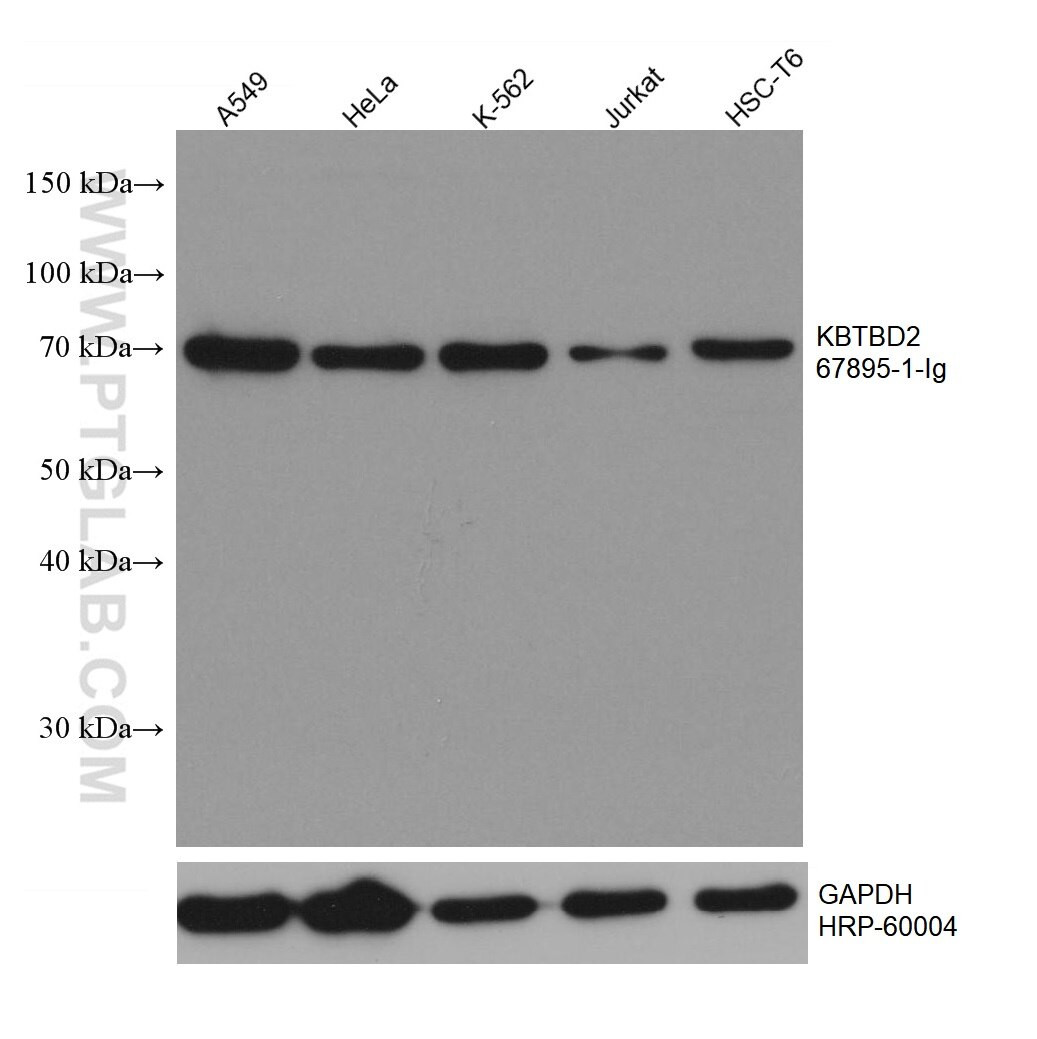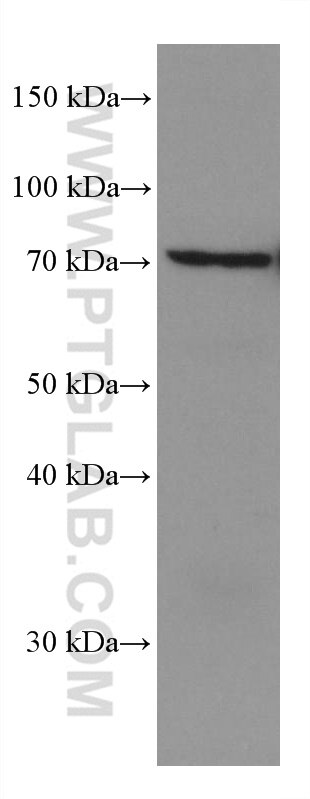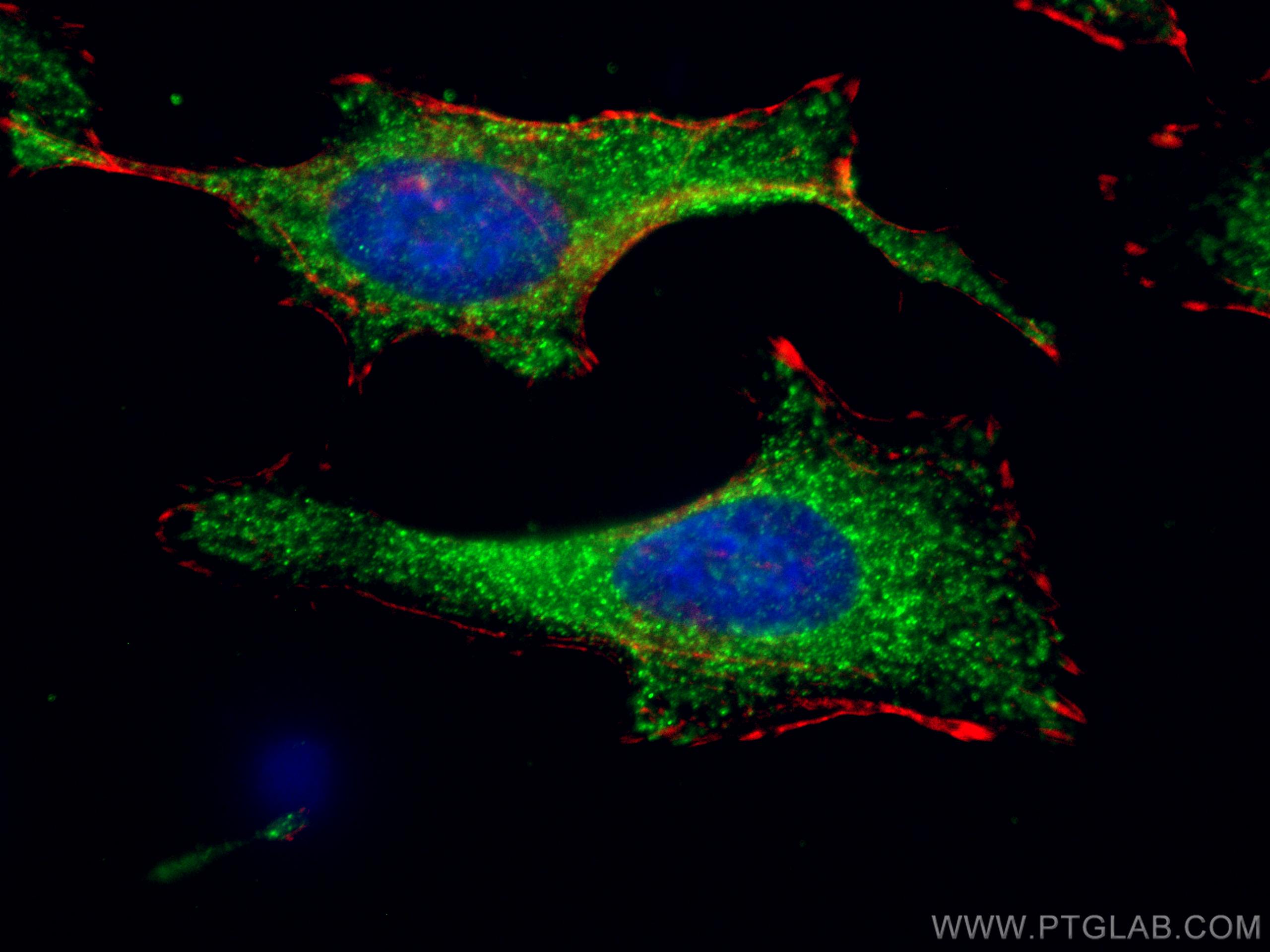- Phare
- Validé par KD/KO
Anticorps Monoclonal anti-KBTBD2
KBTBD2 Monoclonal Antibody for WB, IF/ICC, ELISA
Hôte / Isotype
Mouse / IgG1
Réactivité testée
Humain, rat, souris
Applications
WB, IHC, IF/ICC, ELISA
Conjugaison
Non conjugué
CloneNo.
2A9F3
N° de cat : 67895-1-Ig
Synonymes
Galerie de données de validation
Applications testées
| Résultats positifs en WB | cellules A549, cellules HeLa, cellules HSC-T6, cellules Jurkat, cellules K-562, cellules U2OS |
| Résultats positifs en IF/ICC | cellules HeLa, |
Dilution recommandée
| Application | Dilution |
|---|---|
| Western Blot (WB) | WB : 1:1000-1:6000 |
| Immunofluorescence (IF)/ICC | IF/ICC : 1:200-1:800 |
| It is recommended that this reagent should be titrated in each testing system to obtain optimal results. | |
| Sample-dependent, check data in validation data gallery | |
Applications publiées
| KD/KO | See 1 publications below |
| WB | See 1 publications below |
| IHC | See 1 publications below |
Informations sur le produit
67895-1-Ig cible KBTBD2 dans les applications de WB, IHC, IF/ICC, ELISA et montre une réactivité avec des échantillons Humain, rat, souris
| Réactivité | Humain, rat, souris |
| Réactivité citée | Humain, souris |
| Hôte / Isotype | Mouse / IgG1 |
| Clonalité | Monoclonal |
| Type | Anticorps |
| Immunogène | KBTBD2 Protéine recombinante Ag4933 |
| Nom complet | kelch repeat and BTB (POZ) domain containing 2 |
| Masse moléculaire calculée | 622 aa, 71 kDa |
| Poids moléculaire observé | 60-70 kDa |
| Numéro d’acquisition GenBank | BC047107 |
| Symbole du gène | KBTBD2 |
| Identification du gène (NCBI) | 25948 |
| Conjugaison | Non conjugué |
| Forme | Liquide |
| Méthode de purification | Purification par protéine G |
| Tampon de stockage | PBS with 0.02% sodium azide and 50% glycerol |
| Conditions de stockage | Stocker à -20°C. Stable pendant un an après l'expédition. L'aliquotage n'est pas nécessaire pour le stockage à -20oC Les 20ul contiennent 0,1% de BSA. |
Informations générales
Kelch repeat and BTB domain containing 2(KBTBD2), also known as BTB and kelch domain-containing protein 1, encodes a BTB-Kelch family subunit that p85α-specific recognition for the Cullin3-based E3 ubiqitin ligase complex, which regulates p85α protein ubiquitination and subsequently regulates phosphoinositide-3 kinases (PI3K) signaling (PMID:27708159). However, the expression profile and functional significance of Kbtbd2 is still largely unknown. The Human Protein Atlas which is an online source shows high Kbtbd2 expression in the spleen and thymus, suggesting that Kbtbd2 might involved in immunization (PMID:29331106). In addition, Kbtbd2 is related to Src-induced phosphorylation of protein, spermatogonial stem cell activity(PMID:15623525, 29331106).
Protocole
| Product Specific Protocols | |
|---|---|
| WB protocol for KBTBD2 antibody 67895-1-Ig | Download protocol |
| IF protocol for KBTBD2 antibody 67895-1-Ig | Download protocol |
| Standard Protocols | |
|---|---|
| Click here to view our Standard Protocols |




